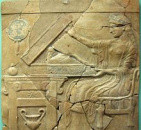In Greek mythology, Persephone , also called Kore , is the daughter of Zeus and the harvest-goddess Demeter, and queen of the underworld. Homer describes her as the formidable, venerable majestic queen of the underworld, who carries into effect the curses of men upon the souls of the dead. Persephone was abducted by Hades, the god-king of the underworld. The myth of her abduction represents her function as the personification of vegetation which shoots forth in spring and withdraws into the earth after harvest; hence she is also associated with spring as well as the fertility of vegetation. Similar myths appear in the Orient, in the cults of male gods like Attis, Adonis and Osiris, and in Minoan Crete.
Persephone as a vegetation goddess and her mother Demeter were the central figures of the Eleusinian mysteries that predated the Olympian pantheon, and promised to the initiated a more enjoyable prospect after death. Persephone is further said to have become by Zeus the mother of Dionysus, Iacchus, or Zagreus usually in orphic tradition. The origins of her cult are uncertain, but it was based on very old agrarian cults of agricultural communities.
Persephone was commonly worshipped along with Demeter, and with the same mysteries. To her alone were dedicated the mysteries celebrated at Athens in the month of Anthesterion. In Classical Greek art, Persephone is invariably portrayed robed; often carrying a sheaf of grain. She may appear as a mystical divinity with a sceptre and a little box, but she was mostly represented in the act of being carried off by Hades.
In Roman mythology, she is called Proserpina, and her mother Ceres.
- ส่วนหนึ่งของคำพูด: proper noun
- อุตสาหกรรม/ขอบเขต: History
- Category: Ancient Greece
ผู้สร้าง
- KSGRAM
- 100% positive feedback
(Athens, Greece)





